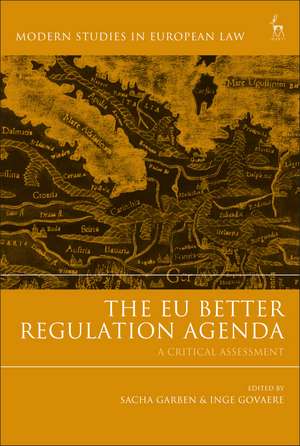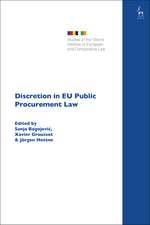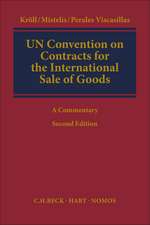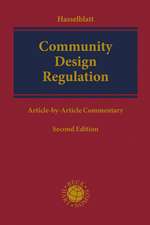The EU Better Regulation Agenda: A Critical Assessment: Modern Studies in European Law
Editat de Sacha Garben, Inge Govaereen Limba Engleză Paperback – 30 sep 2020
| Toate formatele și edițiile | Preț | Express |
|---|---|---|
| Paperback (1) | 298.34 lei 6-8 săpt. | |
| Bloomsbury Publishing – 30 sep 2020 | 298.34 lei 6-8 săpt. | |
| Hardback (1) | 569.45 lei 6-8 săpt. | |
| Bloomsbury Publishing – 16 mai 2018 | 569.45 lei 6-8 săpt. |
Din seria Modern Studies in European Law
- 30%
 Preț: 575.75 lei
Preț: 575.75 lei - 24%
 Preț: 440.21 lei
Preț: 440.21 lei - 31%
 Preț: 594.77 lei
Preț: 594.77 lei - 30%
 Preț: 570.22 lei
Preț: 570.22 lei -
 Preț: 181.55 lei
Preț: 181.55 lei - 30%
 Preț: 541.93 lei
Preț: 541.93 lei - 30%
 Preț: 507.97 lei
Preț: 507.97 lei - 30%
 Preț: 790.77 lei
Preț: 790.77 lei - 34%
 Preț: 509.45 lei
Preț: 509.45 lei - 30%
 Preț: 511.64 lei
Preț: 511.64 lei - 19%
 Preț: 296.91 lei
Preț: 296.91 lei - 30%
 Preț: 571.34 lei
Preț: 571.34 lei - 19%
 Preț: 296.72 lei
Preț: 296.72 lei - 11%
 Preț: 375.73 lei
Preț: 375.73 lei - 30%
 Preț: 539.57 lei
Preț: 539.57 lei - 30%
 Preț: 595.65 lei
Preț: 595.65 lei - 27%
 Preț: 475.10 lei
Preț: 475.10 lei - 30%
 Preț: 572.80 lei
Preț: 572.80 lei - 30%
 Preț: 721.14 lei
Preț: 721.14 lei - 18%
 Preț: 320.53 lei
Preț: 320.53 lei - 18%
 Preț: 321.66 lei
Preț: 321.66 lei - 30%
 Preț: 600.57 lei
Preț: 600.57 lei - 19%
 Preț: 317.21 lei
Preț: 317.21 lei - 30%
 Preț: 571.34 lei
Preț: 571.34 lei -
 Preț: 464.01 lei
Preț: 464.01 lei -
 Preț: 239.77 lei
Preț: 239.77 lei - 30%
 Preț: 538.03 lei
Preț: 538.03 lei - 23%
 Preț: 418.50 lei
Preț: 418.50 lei - 29%
 Preț: 587.97 lei
Preț: 587.97 lei - 30%
 Preț: 774.62 lei
Preț: 774.62 lei - 30%
 Preț: 570.43 lei
Preț: 570.43 lei - 30%
 Preț: 574.10 lei
Preț: 574.10 lei - 28%
 Preț: 495.80 lei
Preț: 495.80 lei - 30%
 Preț: 575.33 lei
Preț: 575.33 lei - 30%
 Preț: 571.24 lei
Preț: 571.24 lei - 30%
 Preț: 510.34 lei
Preț: 510.34 lei - 20%
 Preț: 219.19 lei
Preț: 219.19 lei - 30%
 Preț: 601.69 lei
Preț: 601.69 lei - 30%
 Preț: 513.60 lei
Preț: 513.60 lei - 18%
 Preț: 305.72 lei
Preț: 305.72 lei - 30%
 Preț: 972.83 lei
Preț: 972.83 lei - 30%
 Preț: 515.24 lei
Preț: 515.24 lei - 30%
 Preț: 539.99 lei
Preț: 539.99 lei - 30%
 Preț: 570.83 lei
Preț: 570.83 lei - 30%
 Preț: 571.82 lei
Preț: 571.82 lei - 29%
 Preț: 554.35 lei
Preț: 554.35 lei - 30%
 Preț: 572.06 lei
Preț: 572.06 lei - 13%
 Preț: 258.15 lei
Preț: 258.15 lei - 30%
 Preț: 574.59 lei
Preț: 574.59 lei
Preț: 298.34 lei
Preț vechi: 365.14 lei
-18% Nou
57.09€ • 58.99$ • 47.49£
Carte tipărită la comandă
Livrare economică 19 martie-02 aprilie
Specificații
ISBN-10: 1509941134
Pagini: 256
Dimensiuni: 156 x 234 x 16 mm
Greutate: 0.37 kg
Editura: Bloomsbury Publishing
Colecția Hart Publishing
Seria Modern Studies in European Law
Locul publicării:London, United Kingdom
Caracteristici
Notă biografică
Cuprins
Recenzii
To fully grasp the breadth and depth of the better regulation agenda, insights from all these different fields need to be taken seriously. Recognizing this, Garben and Govaere have edited a book that people interested in the EU's better regulation agenda have been waiting for: a book that aims to take seriously the interdisciplinary nature of this peculiar field of study, and in one comprehensive volume tries to present and perhaps build bridges between often competing disciplines and perspectives to foster new insights. That ambitious attempt alone makes it a book worthy of recommendation.
Descriere
Better Regulation in the EU is a perennial and topical question which has important implications for the future direction of EU law. While actions directed at improving the quality and accessibility of EU regulation are not novel, in recent years the Better Regulation Agenda has significantly affected the structural organisation and day-to-day operation of the EU legislative process. Yet, many questions about the future of the Agenda remain, not least in light of Brexit. Exploring the Better Regulation Agenda (and its relation to the overall EU legal and political order) necessitates an integrated, interdisciplinary approach. This edited volume presents insights from economics, political science and legal scholarship. Furthermore, to allow full understanding, it examines institutional practice, where the Agenda is made and shaped on a daily basis. Hence, the book features contributions from the perspective of the work of the main EU institutions: the European Commission, the Parliament, the Council and the Court of Justice. This results in a seminal overview of the subject, of interest to scholars and practitioners alike.















